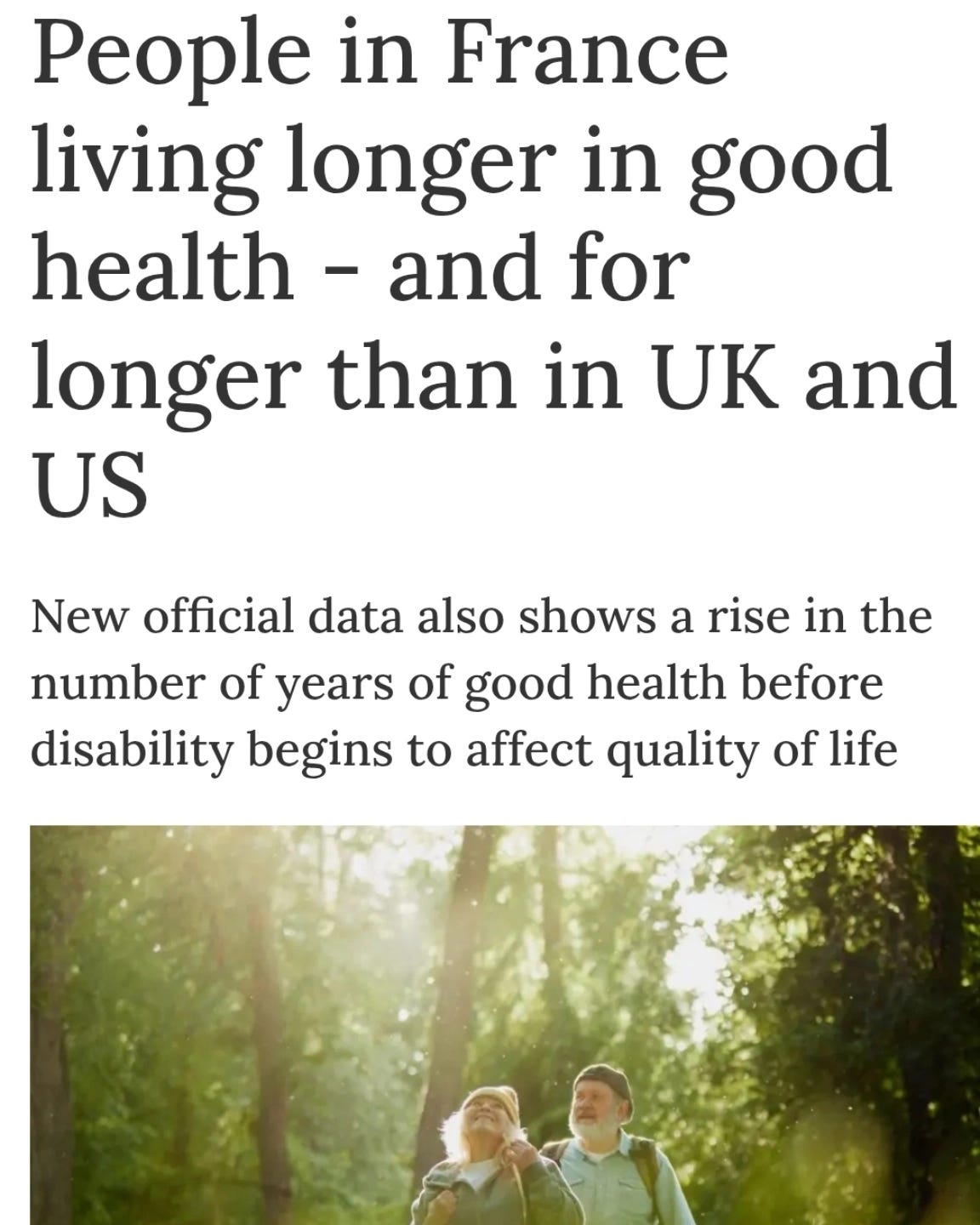The French Advantage: Enjoying More Years of Good Health
In a revealing report released by France’s national statistics research agency, DREES (Direction de la recherche, des études et de l’évaluation des statistiques), the insights into the health and quality of life of French citizens offer a compelling narrative about the benefits of traditional living in France. The study, which extends its analysis through 2023, reveals that French individuals enjoy significantly more years of disability-free life than the European average, setting a benchmark in healthy aging.
Disability-Free Life: Healthy Years Beyond 65
French women, on average, can expect to live until 77 years of age before their health begins to significantly impact their daily activities, while men reach up to 75.5 years. These figures translate into 12 years for women and 10.5 years for men of disability-free life after age 65. This is notably higher than the European Union’s average, where women enjoy just 2 years and 6 months, and men 1 year and 4 months of similar quality life post-65. Of course, this varies depending on the country.
When compared internationally, France’s statistics are impressive. In the UK, the Office for National Statistics reports a lower healthy life expectancy, with figures at 62.7 years for women and 62.4 years for men in England. Similarly, in the US, the World Health Organization’s data shows an average healthy life expectancy at birth of 63.9 years for 2021, indicating a substantial gap compared to France.
Rising Trends in Healthy Life Expectancy
The DREES report also highlights an encouraging trend: According to INSEE, this increase in disability-free life expectancy outpaces the growth in total life expectancy, which stands at 85.7 years for women and 80 years for men. Specifically, since 2008, there has been an increase of nearly 2 years in good health for both genders, suggesting that the onset of chronic diseases associated with aging is being delayed.
Cultural Attitudes Towards Aging in France
France’s traditional cultural approach to aging influences the health and well-being of its elderly population, fostering an environment where older individuals continue to lead active, engaged, and socially connected lives.
Intergenerational Living and Social Integration
Family Ties: Traditional French culture highly values family, with many elderly individuals living with or near their children and grandchildren. This proximity fosters daily interactions crucial for mental stimulation and emotional support (the US and other countries have missed the mark on this one). The concept of “solidarity between generations” is stronger in countries like France, ensuring that older people are not just cared for but are active participants in family life.
France is small (relative to the US): the trains, air travel, buses, metro systems, and good highways make it possible to travel to loved ones, even for those who live in Paris and Nice, which is about an 8-hour drive.
Social Gatherings: Social life in France doesn’t end with retirement. Cafes, markets, and community centers are hubs where all ages mingle. This integration helps combat loneliness and isolation, a significant risk factor for health decline and even suicide, in the elderly. Events like “fêtes” or local festivals are inclusive, encouraging participation from all age groups. We attended our local village, “fête” in Sillans; about everyone from the village attended, and it was in a centuries-old building with character. It’s not to say it was the most exciting time in life but getting to know the people you live with creates connections and opportunities.
Active Lifestyle
Physical Activity: The French cultural appreciation for outdoor activities, from walking in parks like the Tuileries, hiking 20 kilometers, or hunting mushrooms in season. In my experience (at least in Provence), it’s common to see neighbors in their 70s and 80s performing these activities.
Lifelong Learning and Cultural Engagement: France encourages intellectual engagement through institutions like the “Université du Temps Libre” (University for Free Time), where seniors can pursue education in various fields. Cultural outings to museums, theaters, and concerts are also common, providing continuous mental stimulation.
Respect and Role of the Elderly
· Respect for Wisdom: Traditional French culture reveres the wisdom and experience of the elderly. This respect ensures that older individuals feel valued, which can be incredibly empowering and motivating for maintaining health.
· La Fête des Mères (Mother's Day): Celebrated widely in France, Mother's Day is a significant event where mothers are honored with gifts, flowers, and special meals. This celebration is not just a commercial day but is deeply ingrained in French culture, with origins linked to both republican and Catholic traditions, emphasizing the societal importance of mothers.
Visibility in Media and Arts: French cinema, literature, and the arts often depict older characters in complex, positive roles, not just as peripheral figures. This cultural representation helps shape societal views that aging is natural rather than something to fear or avoid. You don’t often hear about ‘longevity’ contests. Instead, when it happens, it’s celebrated. Some examples are Robert Marchand, the hour record holder in cycling for 105-year-olds, and the longest-lived French woman, Jeanne Louise Calment, who lived to the age of 122 years and 164 days. Born on February 21, 1875, in Arles, France. Despite her age, Calment was quite active in her earlier years; she took up fencing at 85 and rode her bicycle daily until she was over 100. She lived independently until she was 110. Her lifestyle included enjoying chocolate, red wine, and smoking, which she did until she was 117. I guess she wouldn’t fit well in the NHANES study!
Healthcare and Social Services
Preventive Health Culture: The French healthcare system’s focus on preventive care means that elderly care isn’t just reactive. Regular check-ups, screenings, and wellness programs encourage seniors to take an active role in their health, often in community settings where they can socialize. However, in my experience, this is becoming harder with the recent financial difficulties put on the French system, which have led to cutbacks in services, longer wait times for appointments, and more expensive insurance. Despite these challenges, the system continues to prioritize preventive care and community-based health initiatives for seniors.
Positive Aging Initiatives
Cultural Narratives: The French narrative around aging often celebrates the lifestyle one can lead in later years, focusing on the joys of slower, thoughtful living, culinary pleasures, and the arts rather than just health concerns. This narrative emphasizes the value of experience, the importance of maintaining social connections, and the opportunities for personal growth that come with age. In my cycling club in Barjols, we have many cyclists in their 70s — who are very strong riders. We always make sure we ride as a group, and utmost respect is given to those older cyclists. By fostering an environment where aging is associated with continued engagement, social connectivity, and cultural participation, France not only enhances the health outcomes for its elderly but also redefines what aging can look like.
Traditional French
I’ve used the word “traditional French” throughout this article. France has long been celebrated for its cultural contributions to art, fashion, and, notably, cuisine. However, when it comes to longevity, there’s a stark contrast between the traditional French way of life, and some current trends that veer in less healthful directions. A stark example is 1997-2012: The Obepi-Roche surveys (1997-2012) documented a significant rise in obesity from around 8.5% in 1997 to 17% by 2012 among French adults. This period marked a sharp increase from previous decades when France’s obesity rates were much lower. Recent data from The Ligue Contre l’Obésité’s study indicated that 47.3% of the French population was overweight or obese, with 17% being obese.
Conclusion
As France continues to lead in healthy life expectancy, it is a potential model for health policy and lifestyle choices worldwide. For those contemplating where to spend their later years, France’s statistics present a compelling case for a life of extended health and vitality.
Other articles on France:
The People We Meet – Jean Michel Bayle
This is an amazing story about helping Jean Michel Bayle, who is a former world motocross champion in both Europe and USA who later transitioned to GP Road Racing. Jean Michel Bayle (JMB) came to the US in 1989, the last year I raced competitive motocross as an aspiring professional. I would never compete against JMB as our lives took very different paths. JMB went on to dominate the European and American motocross scene, winning multiple titles. I stopped racing in 1989 and dedicated myself entirely to becoming a medical doctor. Because of my motocross history, many contact me for medical and training advice. Recently, my friend Ulrich Genisson (
Book: The Science of the Marathon
In marathon running, we often hear, above all, make it to the finish line! Life is not only about racing and accepting the medal, but it’s true that racing adds spice to our lives.











